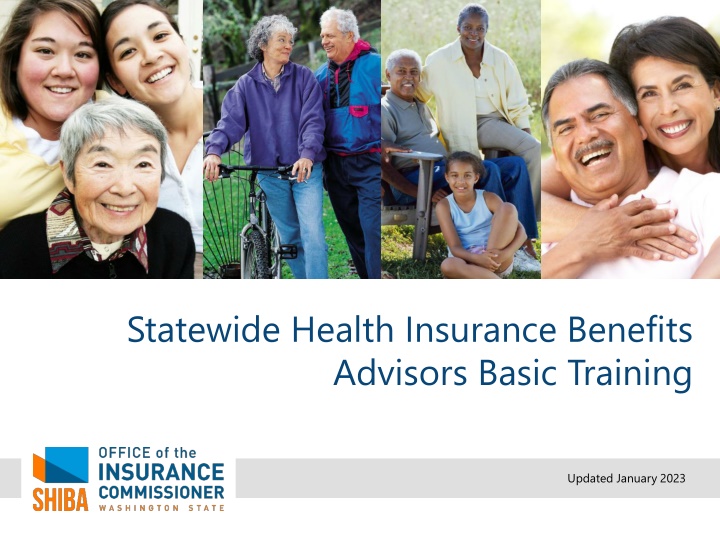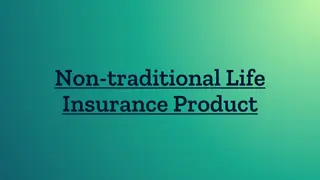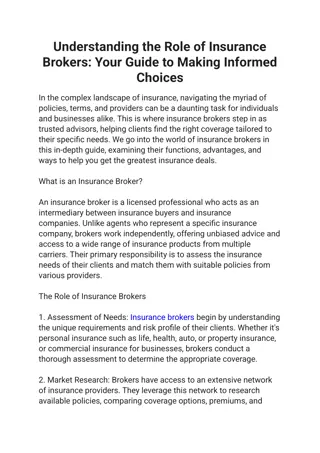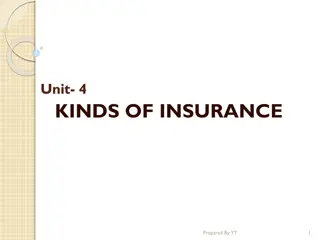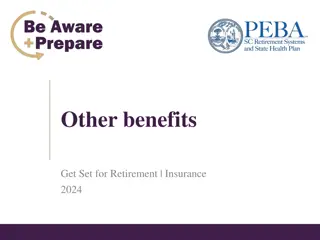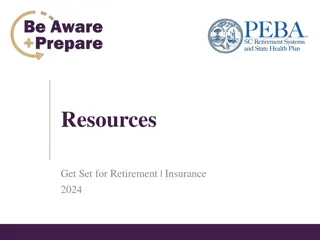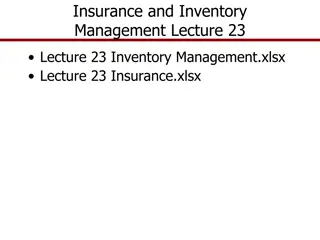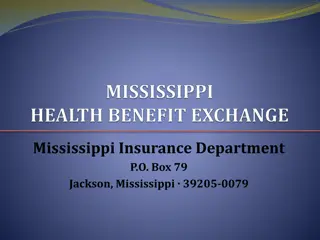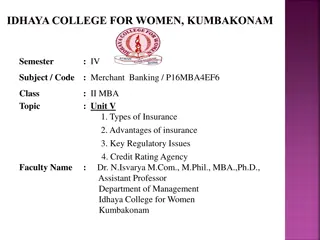Statewide Health Insurance Benefits Advisors Basic Training
Welcome to the Statewide Health Insurance Benefits Advisors (SHIBA) basic training. Learn about Medicare, enrollment periods, insurance terms, and more. Acronyms like PDP, PFFS, and SNP will be explained. Prepare to become a knowledgeable advisor in the health insurance field.
Download Presentation

Please find below an Image/Link to download the presentation.
The content on the website is provided AS IS for your information and personal use only. It may not be sold, licensed, or shared on other websites without obtaining consent from the author.If you encounter any issues during the download, it is possible that the publisher has removed the file from their server.
You are allowed to download the files provided on this website for personal or commercial use, subject to the condition that they are used lawfully. All files are the property of their respective owners.
The content on the website is provided AS IS for your information and personal use only. It may not be sold, licensed, or shared on other websites without obtaining consent from the author.
E N D
Presentation Transcript
Statewide Health Insurance Benefits Advisors Basic Training Updated January 2023
Welcome to the Statewide Health Insurance Benefits Advisors (SHIBA) basic training! As a part of introductions, please share what you would like to learn during this training. What questions would you like to have answered? A few notes: Your trainer may adjust the following slides depending on your level of experience and/or if this is a one- or two- day training. The electronic version of this training includes notes for many slides and is posted on My SHIBA. Ask your trainer for more information. 2 Statewide Health Insurance Benefits Advisors Basic Training
Basic Training table of contents Slide # 1-4 5-7 8-12 13-32 33-36 37-46 47-58 59-76 77-89 90-105 106-119 120-128 Content Welcome, introductions and acronyms Goals, references and training checklist Learning objectives and certification Advisor orientation Insurance terms and acronyms Medicare introduction Enrollment and enrollment periods Original Medicare: Parts A and B Medicare prescription drug coverage: Part D Medigaps Medicare Advantage plans: Part C Training tools and wrap up 3 Statewide Health Insurance Benefits Advisors Basic Training
Medicare training acronyms Here s a list of acronyms used in this presentation: OTC Over-the-counter PDP Prescription Drug Plan PFFS Private Fee-for-Service PPO Preferred Provider Organization RTC Regional Training Consultant SEP Special Enrollment Period SHIBA Statewide Health Insurance Benefits Advisors SHIP State Health Insurance Assistance Program SMP Senior Medicare Patrol SNP Special Needs Plans SSA Social Security Administration STARS SHIP Tracking and Reporting System SSDI Social Security Disability Insurance VC Volunteer Coordinator ESRD End Stage Renal Disease GEP General Enrollment Period HMO Health Maintenance Organization IEP Initial Enrollment Period LIS Low Income Subsidy (Extra Help) LPR Legal Permanent Resident MA Medicare Advantage (Part C) MAPD Medicare Advantage Plans with Prescription Drug Coverage MIPPA Medicare Improvements for Patients and Providers Act MSP Medicare Savings Program OEP Open Enrollment Period OIC Office of the Insurance Commissioner OM Original Medicare (Parts A & B) A more detailed list is included with your training materials. Training acronym lists are also available by searching acronym on My SHIBA at www.insurance.wa.gov/my-shiba. 4 Statewide Health Insurance Benefits Advisors Basic Training
Goals for this training Provide you with a broad high-level overview about: o SHIBA o Medicare o Senior Medicare Patrol (SMP) Ensure you re a confident candidate and have the basic training you need to move on to the SHIBA Path to Certification. The SHIBA Path includes the steps you ll complete before you start advising clients on your own. 5 Statewide Health Insurance Benefits Advisors Basic Training
Primary training references Medicare & You (www.medicare.gov/Pubs/pdf/10050-Medicare- and-You.pdf) We reference this guide throughout this presentation with corresponding page numbers. The SHIBA Volunteer Handbook (www.insurance.wa.gov/media/1548) is your guide for working in your SHIBA role. 6 Statewide Health Insurance Benefits Advisors Basic Training
Your training checklist Here s a list of materials you ll receive today in your three-ring binder: Front pocket Medicare & You and a SHIBA pen Get help paying for Medicare brochure Local MA plans list (Specific to county) 3-ring materials Basic advisor training packet Glossary of health care coverage and medical terms Frequently-used acronyms or acronyms Your Medicare coverage choices Medicare Part A & B covered services Approved Medicare Supplement (Medigap) plans chart What you need to know about Medigaps Comparing Medicare Supplement (Medigap) and Medicare Advantage plans Medicare Advantage plans: What you need to know before you buy Medicare Part D stand-alone prescription drug plans Medicare help rainbow chart SHIBA client counseling six-step intake script Back pocket Basic training evaluation Case studies (Contact your trainer) Quizzes (Contact your trainer) SHIBA STARS Beneficiary Contact Form Resource referral guide 7 Statewide Health Insurance Benefits Advisors Basic Training
Basic training learning objectives 8 Statewide Health Insurance Benefits Advisors Basic Training
Learning objectives At the end of your basic training, you should be able to: Explain SHIBA s scope and mission. Describe the basic framework of Medicare, including the four parts. Explain at least five ways a SHIBA volunteer can assist and advocate for people who need help with Medicare. Describe the Medicare Plan Finder, where to find it and how it can help a client. Explain the differences between Medicare Advantage (MA) plans and Original Medicare, and list the components of each. Continued on next slide 9 Statewide Health Insurance Benefits Advisors Basic Training
Learning objectives (continued) Explain the importance of confidentiality and SHIBA s expectations. List at least 10 authoritative Medicare resources and where to find them. List and describe the four main enrollment periods. Describe how to know if a Medicare resource is authoritative. Explain your boundaries within SHIBA s scope and your role with SHIBA. Continued on next slide 10 Statewide Health Insurance Benefits Advisors Basic Training
Learning objectives (continued) Be able to answer basic questions about Medicare, such as: o How and when do I enroll in Medicare? o What are the basic differences between Original Medicare and Medicare Advantage plans? o What is a Medigap? Explain what you know about Medicare and what you do not yet know about Medicare. 11 Statewide Health Insurance Benefits Advisors Basic Training
Certification After you complete basic training, you ll take an open book exam. Get more information about the exam from your volunteer coordinator (VC) or regional training consultant (RTC). After you pass the exam and successfully complete mentoring, we ll certify you as a SHIBA volunteer. This is not the end of your training, it s the start of a rewarding journey! 12 Statewide Health Insurance Benefits Advisors Basic Training
SHIBA advisor orientation 13 Statewide Health Insurance Benefits Advisors Basic Training
Volunteer advisor orientation basics Thank you for your interest in serving as a volunteer advisor for SHIBA! Your work and commitment will contribute to helping the lives of thousands of people across the state as they navigate their way through Medicare. 14 Statewide Health Insurance Benefits Advisors Basic Training
Volunteer advisor orientation overview This section of slides will cover: 1. 2. 3. 4. 5. 6. 7. 8. 9. 10. How we ll help you: Staff and training 11. Next steps and advisor mentoring Who we are and what we do our mission When we started some history and funding info A note about SHIPs, SMPs and MIPPA SHIBA s scope Who s an advisor? Duties and work scope Referrals Volunteer roles Types of cases 15 Statewide Health Insurance Benefits Advisors Basic Training
SHIBA and our mission statement SHIBA is the Statewide Health Insurance Benefits Advisors and we re part of the Washington state Office of the Insurance Commissioner. SHIBA s Mission SHIBA provides free, unbiased information about health care coverage and access to help improve the lives of all Washington residents. We cultivate community commitment through partnership, service and volunteering. 16 Statewide Health Insurance Benefits Advisors Basic Training
SHIBA history The first State Health Insurance Assistance Program (SHIP) began in our state in 1979. All states have a SHIP program. SHIBA is funded by the federal government. In Washington state, we are also funded by the state legislature. http://ts1.mm.bing.net/th?id=H.4664262719048060w=274h=188c=7rs=1url=http%3a%2f%2fnewstalkkit.com%2fno-pay-raise-for-state-workers%2fpid=1.7 17 Statewide Health Insurance Benefits Advisors Basic Training
SHIBA history how it works Funding comes to SHIBA through federal and state resources. SHIBA uses these funds to award grants to sponsors in our state to provide SHIBA services statewide. SHIBA provides volunteer training and education. Each sponsor site has a volunteer coordinator who manages the SHIBA program in their area. These programs are mainly staffed by volunteers. 18 Statewide Health Insurance Benefits Advisors Basic Training
A note about SHIPs, SMPs and MIPPA SHIBA is a State Health Insurance Assistance Program (SHIP). Senior Medicare Patrols (SMPs) empower and assist Medicare beneficiaries, their families and caregivers to prevent, detect and report health care fraud, errors and abuse. The Medicare Improvements for Patients and Providers Act (MIPPA) of 2008 is a piece of legislation related to Medicare. One important provision of MIPPA was the allocation of federal funding to help low-income beneficiaries apply for programs that make Medicare affordable. 19 Statewide Health Insurance Benefits Advisors Basic Training
SHIBAs scope: Work expectations It s important that SHIBA volunteer advisors, sponsors and staff provide the same level of service across the state to ALL clients and work within the program s service scope. It s also important to know when to ask for help for questions you cannot answer and when to refer a client to a colleague or another agency. Unless specifically stated, volunteer policies apply to all volunteers in all SHIBA programs and projects. This includes volunteer involvement that s organized and managed by sponsor organizations. For more information on SHIBA s scope, see the SHIBA volunteer handbook pages 36-38. 20 Statewide Health Insurance Benefits Advisors Basic Training
Volunteer duties & scope Duties within a volunteer s scope Screen clients eligibility for various health care coverage options. Provide unbiased information about Medicare and health insurance options. Advise points to think about regarding Medicare and health insurance options. Educate about Medicare fraud identification and prevention. Counsel and/or enroll in Medicare programs and plans when eligible and appropriate. Help low-income clients research their prescription and co-insurance options. 21 Statewide Health Insurance Benefits Advisors Basic Training
Whos a SHIBA volunteer advisor? Volunteer advisors are the foundation of our Statewide Health Insurance Benefits Advisors (SHIBA) program. A SHIBA volunteer advisor can be anyone who: Is interested in committing the time it takes to advise and counsel others about Medicare. Is not a licensed insurance agent. Passes a background check. Can bring honesty, integrity and confidentiality to their role. Statewide Health Insurance Benefits Advisors Basic Training 22
Confidentiality SHIBA expects and requires protecting client information. Volunteer coordinators (VCs) and volunteers are responsible for maintaining the confidentiality of all proprietary or privileged information to which they are exposed while serving as a volunteer, whether this information involves a staff member, a volunteer, a client or others, or involves the overall business of SHIBA. Continued on next slide 23 Statewide Health Insurance Benefits Advisors Basic Training
Confidentiality (continued) VCs and volunteers should take all steps necessary to safeguard the confidentiality of all SHIBA and client- related information and to prevent personal client information from falling into the possession of unauthorized people. VCs and volunteers should only use any information collected or obtained during their SHIBA work to assist the client or otherwise fulfill VC and volunteer role responsibilities. Continued on next slide 24 Statewide Health Insurance Benefits Advisors Basic Training
Confidentiality (continued) VCs and volunteers must use secure and encrypted methods when sending emails that contain personally identifiable client information. Anyone who collects and obtains information while doing SHIBA work must not disclose that information unless clearly approved by an authorized SHIBA representative. There is zero tolerance for breaches of confidentiality in connection with work at SHIBA. 25 Statewide Health Insurance Benefits Advisors Basic Training
Roles for SHIBA volunteers There are lots of opportunities for SHIBA volunteers. Many of you will be involved with advising and counseling clients. Work with your VC to determine the training you ll need for the role of Medicare: Counselor Fraud advisor Outreach/exhibitor Administrative support 26 Statewide Health Insurance Benefits Advisors Basic Training
Types of cases you might receive For counseling advisor roles, you might receive one or more of these kind of cases: New to Medicare. How and when to enroll in Medicare. How to interpret billing paperwork and appeal denials. Questions about covered and non-covered benefits provided by Original Medicare, Parts A & B, Medicare Advantage plans, Medigaps or Part D. Plans or service needs that we refer to other agencies. Requests to use Medicare Plan Finder (on medicare.gov) for help with getting medications covered and at lowest cost. Complex cases that could require a referral, such as those for billing errors and fraud. 27 Statewide Health Insurance Benefits Advisors Basic Training
Referrals and providing more insurance help You can also help your clients by letting them know about the OIC s statewide toll-free Insurance Consumer Hotline at: 1-800-562-6900. The Consumer Hotline is a free service where clients can get help with all types of insurance, such as home, auto, health, life, disability coverage, long-term care and even annuities. Clients can also find more information at: https://www.insurance.wa.gov 28 Statewide Health Insurance Benefits Advisors Basic Training
How well help you SHIBA staff include specialists in training, program management, communications, grant management, Medicare complaints and program administration. VCs will provide supervision, mentoring and training. Regional training consultants will provide monthly Medicare training and support. Training sources include SHIBA sponsor locations and the My SHIBA website at https://www.insurance.wa.gov/my-shiba. 29 Statewide Health Insurance Benefits Advisors Basic Training
Next steps include: Taking the certification exam. Mentoring (see the next slide). Knowing how to access and use the Volunteer Handbook. Asking for help. Locating tools for you to succeed. Getting to know your colleagues. Knowing important rules. Being recognized annually for your work. Your VC will help you on your path to certification! See your binder for the Path to SHIBA certification tracking sheet https://www.insurance.wa.gov/media/6542. What are your expectations and questions? 30 Statewide Health Insurance Benefits Advisors Basic Training
Advisor mentoring Advisors receive specific on-the-job training, which provides the information and skills they need to perform their volunteer assignment. After you complete Basic Training, the VC will set up mentoring training to provide skills and techniques for those who ve chosen to become a counselor. You ll receive more information on each of these as you progress through training. Some training tools may include: Medicare.gov and Medicare Plan Finder STARs database Department of Enterprise Services, Fulfillment Center SHIP Technical Assistance Center CMS National Training Program Senior Medicare Patrol 31 Statewide Health Insurance Benefits Advisors Basic Training
Knowledge check Q1 What are examples of the type of cases you might receive as a SHIBA advisor? What are some examples of duties within a SHIBA advisor s scope of work? What is the primary purpose for protecting client confidentiality? What is a referral number you can give to clients if they need help with Medicare? Q2 Q3 Q4 Answers on slide 130 32 Statewide Health Insurance Benefits Advisors Basic Training
Insurance terms and acronyms 33 Statewide Health Insurance Benefits Advisors Basic Training
Health coverage and medical terms Please reference the handout in your binder. It is also posted on My SHIBA. 34 Statewide Health Insurance Benefits Advisors Basic Training
Insurance terms activity What is the definition of each of the following terms? Appeal Coinsurance Copayment Cost sharing Deductible ESRD Formulary Health insurance Medically necessary Network Plan Preferred provider Premium Provider Screening Specialist Answers are on the handout in your binder or on My SHIBA (search for glossary). 35 Statewide Health Insurance Benefits Advisors Basic Training
Insurance acronyms See the list at the start of this slide presentation. Acronym lists and a glossary of terms are available on My SHIBA (https://www.insurance.wa.gov/my-shiba). Search for acronym or glossary. Medicare.gov also has a training glossary. 36 Statewide Health Insurance Benefits Advisors Basic Training
Medicare introduction 37 Statewide Health Insurance Benefits Advisors Basic Training
Medicare 101 Medicare is our country's health insurance program for people age 65 or older, and certain people under age 65 with disabilities. The program helps with the cost of health care but it doesn t cover all medical expenses or the cost of most long-term care. Clients have choices for how they get Medicare coverage. If they choose to have Original Medicare (OM) coverage, they can buy a Medicare supplement policy (Medigap) from a private insurance company to cover some of the costs that Medicare does not. Continued on next slide 38 Statewide Health Insurance Benefits Advisors Basic Training
Medicare 101 (continued) Medicare has four parts: 1. Part A is hospital insurance 2. Part B is medical insurance 3. Part C is Medicare Advantage 4. Part D is Medicare prescription drug coverage If clients can t afford to pay Medicare premiums and other medical costs, they may be able to get help from their state. Continued on next slide 39 Statewide Health Insurance Benefits Advisors Basic Training
Medicare 101 (continued) States offer programs for people eligible for or entitled to Medicare who have low income. Some programs may pay for Medicare premiums, and some pay Medicare deductibles and coinsurance. To qualify, they must have Medicare Part A and have limited income and resources. Continued on next slide 40 Statewide Health Insurance Benefits Advisors Basic Training
Medicare 101 (continued) Medicare clients have options. We ll start by covering the basics of each part of Medicare and later we ll look more closely at the coverage options shown at the right. 41 Statewide Health Insurance Benefits Advisors Basic Training
The four parts of Medicare 42 Statewide Health Insurance Benefits Advisors Basic Training
Who is eligible for Medicare? Age 65 and older. Under age 65 and deemed disabled (Social Security Disability Insurance) by the Social Security Administration (SSA). o 24-month waiting period o No waiting period if diagnosed with ESRD or ALS Note: Must be a US citizen or legal permanent resident (LPR). If a client is an LPR, they must reside in the U.S. for 5 continuous years. 44 Statewide Health Insurance Benefits Advisors Basic Training
Medicare card Are clients using the new Medicare card that came out in 2020? Tell them to guard their card. Help prevent fraud! https://www.facebook.com/medicare/videos/guard-your- medicare-card/930570750674196/ 45 Statewide Health Insurance Benefits Advisors Basic Training
Knowledge check Q1 What are the four parts of Medicare? Q2 Who is eligible for Medicare? Q3 What are the residency requirements to be eligible for Medicare? Answers on Slide 130 46 Statewide Health Insurance Benefits Advisors Basic Training
Enrollment and enrollment periods 47 Statewide Health Insurance Benefits Advisors Basic Training
Some people are automatically enrolled Automatic enrollment for people who turn 65 and receive: o Social Security benefits and/or o Railroad Retirement Board benefits Automatic enrollment also occurs for people: o Under age 65 who apply to SSA for SSDI disability benefits (SSDI is Social Security Disability Insurance). Most of those with SSDI must have received it for 24 months. Will receive an enrollment packet, including a Medicare card in the mail. 48 Statewide Health Insurance Benefits Advisors Basic Training
When enrollment is NOT automatic If client is not receiving Social Security Administration (SSA) retirement income o They will need to enroll with Social Security: Online at www.ssa.gov Call 1-800-772-1213 Visit local SSA office If a client has questions about enrollment, have them contact Social Security at www.ssa.gov. 49 Statewide Health Insurance Benefits Advisors Basic Training
Three main Medicare enrollment periods 1. Initial Enrollment Period (IEP) 2. Special Enrollment Period (SEP) 3. General Enrollment Period (GEP) There s also an Open Enrollment Period (OEP) that we ll cover in another section. This is just the start. The client will have more decisions to make along their path! 50 Statewide Health Insurance Benefits Advisors Basic Training
Initial Enrollment Period When the client is first eligible to sign up for Medicare, the IEP is the 7-month window they have to sign up. Starts 3 months before client s 65th birthday Includes the client s birthday month Ends 3 months after client turns 65 Continued on next slide 51 Statewide Health Insurance Benefits Advisors Basic Training
